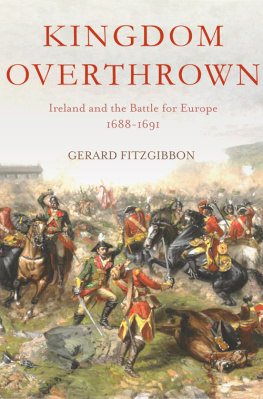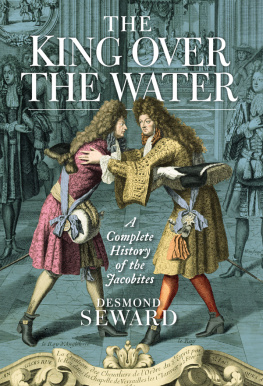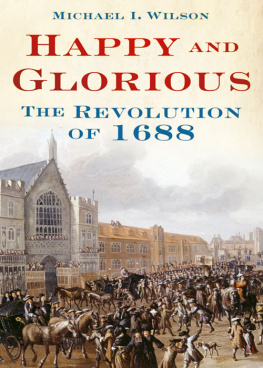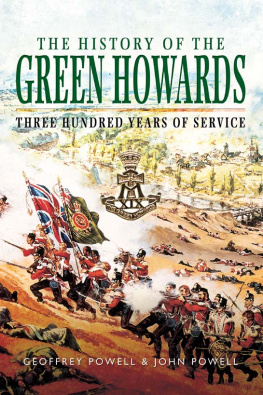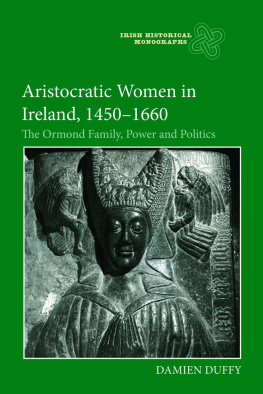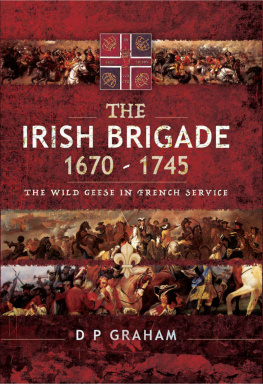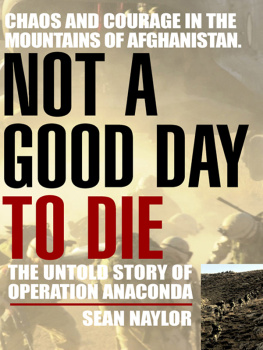Kingdom
Overthrown
Ireland and the Battle for
Europe, 16881691
Gerard Fitzgibbon
Kingdom
Overthrown
KINGDOM OVERTHROWN
First published in 2015 by
New Island Books
16 Priory Hall Office Park
Stillorgan
County Dublin
Republic of Ireland.
www.newisland.ie
Copyright Gerard Fitzgibbon, 2015
PRINT ISBN:978-1-84840-475-5
EPUB ISBN:978-1-84840-476-2
MOBI ISBN:978-1-84840-477-9
All rights reserved. The material in this publication is protected by copyright law. Except as may be permitted by law, no part of the material may be reproduced (including by storage in a retrieval system) or transmitted in any form or by any means; adapted; rented or lent without the written permission of the copyright owner.
British Library Cataloguing Data.
A CIP catalogue record for this book is available from the British Library.
Contents
For Mum and Dad,
and Martha
Introduction
I was born in England to Irish parents. When I was a boy my father gave me an old storybook of Greek legends, which told me of the feats of Perseus, Hercules, Odysseus and Jason. The idea that bizarre and marvellous things might live in the past was what first kindled my love of history. When I went to secondary school in Ilford, I learned about the industrial revolution and the Great War and Britains firm, proud strides into the twentieth century. Then, in 1998, my family moved to Ireland. Sitting in a new school and opening a new textbook, I found a strange story staring back at me. History, I was now told, actually began with Parnell, the Home Rule movement, and Irelands final fight for independence. England was no longer a proud old dame, but a tyrant. I read and listened, but it took a while to fully understand. Every nation teaches its children the story of how it won. It follows, therefore, that defeats and humiliations are tucked away. Most Irish men and women of my generation can speak comfortably about Michael Collins and Eamon de Valera. Ask them about Richard Talbot or James II, however, and many will shrug. This is not criticism; it is simply what we were all taught.
In the six years that I spent working as a journalist at an Irish regional newspaper, I always sought the human within every story. The world is built on numbers and stone, but people built it. When I look at a four-hundred-year-old wall, I think of the man who laid the bricks. When I read about Ulysses Grant or Simon Bolivar or Edward IV, I picture them as men, tapping their fingers and struggling with the weight of a cause. It helps to remember that history always begins as dirt, blood and water. Only time and teaching turn it into ink. In Ireland, this ancient and beautiful old rock, history is all around us. It is up to us whether or not we choose to see it.
This book is a narrative account of what we now call the Williamite War in Ireland. It is told as a story, not a succession of inevitable events and conclusions. The war and the constitutional crisis that spawned it was a violent, dramatic, and visceral time, and much of it spun on luck. The conflict meant something different to everyone it swallowed: to James Stuart, it was a fight to regain his kingdoms. For William of Orange and Louis XIV of France, it was a new frontier in a great European brawl. To the gentry and noblemen who took commissions and raised regiments, it was a battle for Irelands land, and the wealth and prestige that flowed from it. For the common folk of Ireland, Protestant and Catholic alike, it was a war for the right of their king to secure their religion. The tale of passion, tragedy and heroism that these men and women shared does not deserve to be told in black, white or grey.
This book exists because I, like so many of my generation, was vaguely aware that this war took place but had little sense of its breathtaking scale, cost and consequences. In school we are not taught that it was the only continental war ever fought in Ireland, or that in the Battle of Aughrim it witnessed the bloodiest single day in Irish history. We walk through the streets of Pennywell in Limerick, but never think of the titanic hand-to-hand struggle that took place under our feet. We stand on the old walls of Derry and look out at the proud city that has grown around them, but we cannot see the wretched forest of tents and corpses that once clogged the horizon. The story of this war has been reduced to anecdotes and folded away. I believe it is time to bring it back to life.
It is necessary to clarify a few things before this story begins. All dates in this book are taken from the old Julian calendar, which was still in use in England and Ireland at the time, not the modern Gregorian calendar, which exists today. There is roughly an eleven-day lag between the two, but I have kept to the old style simply because these were the dates used by every diarist, printer and clerk. Distances and measurements are likewise given in the old imperial format of miles, yards and inches. There is also some prickly housekeeping to be addressed. Whether the great citadel of Ulster is named Londonderry or Derry can split opinion like a pickaxe. I have sought to tread water by referring to the county by the former name, and the city by the latter. I accept that this is a crude compromise that may offend someone, or everyone, but that is the risk I must take.
My generation has known more of peace than war. We are one of the few in human history able to say that. The Troubles of Northern Ireland, though not yet confined to memory, are slowly being left behind. There is distance enough now, perhaps, to read about the men who fought and died at Athlone and the Boyne without choking on the prejudices of the past. Little good comes from being bound by history, but it should not be ignored either. This book was not written to massage a particular point of view, or to challenge facts that already exist. Nor is it a biography of James II, William III, Richard Talbot or any other man. I have not sought to explore rumour, innuendo, sexuality or gossip. It is a book about people, mighty and poor alike, standing in muddy battlefields or draughty palaces, each finding themselves sucked into a great and furious moment. It is a human history.
Gerard Fitzgibbon
Summer, 2015
Acknowledgements
This book would not exist were it not for the help, direct and otherwise, of so many people. Firstly, I would like to thank the team at New Island Books for bringing my idea to life, particularly Eoin Purcell for taking the project on and Dan Bolger for seeing it through. I owe much to my editor, Emma Dunne, for helping turn a squishy first draft into something more. Emmas patience, insight and extraordinary eye for detail have been invaluable, and I am truly grateful that she was part of this journey.
I also wish to thank the teachers, lecturers and storytellers who kept me hooked on history throughout my life. There is the late Mr Farrar, history teacher at Ilford County High School, who once got us to re-enact the assassination of Archduke Franz Ferdinand in class, and encouraged us to use items from our pencil cases as improvised explosives. Then there is Professor Roger Sarty of Wilfried Laurier University in Waterloo, Ontario, who delivered the most memorable lecture I ever attended: a three-hour, grippingly detailed account of combined arms warfare in the Second World War, delivered without a single page of notes for reference. Closer to home, I wish to thank Dr Ruan ODonnell of the University of Limerick for his frank and honest advice, and Dr Padraig Lenihan, formerly of UL and now of NUI Galway, who is one of the finest scholars of seventeenth-century-Ireland and provided me with valuable advice back when this book was just an idea.
Next page
